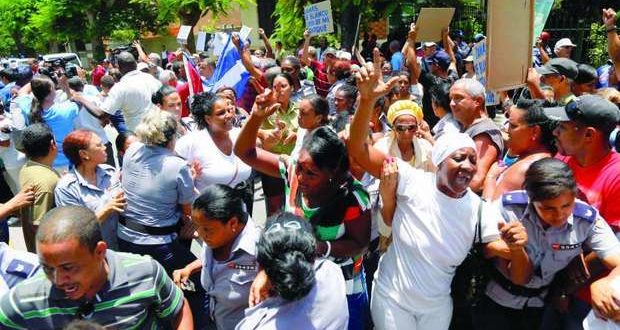
Ivan Garcia, 10 May 2017 — When he is particularly bored, after flicking through the eight channels that there are on the island, 56 year old civil engineer Josuan watches the national news some nights with a smirk only to later write a critical analysis on the state press’s awful performance.
“The Cuban press is disgusting. The news channels and local newspapers are a compendium of good news that exalts the supposed achievements and conceals the deficiencies. It is journalism that does not reflect what ordinary people want. They manipulate absolutely everything, that or they disguise and hide information. Venezuela is the best example. The protests in capitalist countries are in order to defend social conquests and they are suppressed by the police’s heavy-handedness. Venezuela’s news is lead by terrorists and fascists that want to give Maduro’s state a blow and never mention police brutality. For this reason, people who want to be well-informed go to illegal cable channels or read foreign press on the internet”, expresses Josuan.
To date, Cuba’s state journalism is a tribute to the absurd. Cantinflas falls short; a choir of trained scribes and ventriloquists manage in their thick opinion pieces to defend a system that is incapable of guaranteeing decent housing for many families, sufficient food and a living wage.
Freedom of expression is quashed on the island by the government’s propaganda. It all started when Fidel Castro abolished the private and republican press shortly after his arrival into power in 1959.
It buried honest and different exchanges from other political ideals and schools of thought. The control of the press, the banning of other parties and of carrying out strikes to demand greater salaries cut off a great number of rights that any modern society is entitled to. It transformed Cuba into the perfect dictatorship.
An executive machine that repressed or silenced people to dissident voices with the threat of several years imprisonment. The government became the owner of newspapers, magazines, television channels, radio programmes and publishing houses.
Fidel Castro’s model can be summarised in one of his own statements: “Inside the Revolution, everything, outside the Revolution, nothing.” Fear silenced the average citizen.
Histrionics and simulation became a mask, used by the populace for convenience, to elect people’s delegates who do not actually solve anything, to applaud an ideology that is not theirs and to appear loyal to the regime by using language that is full of slogans.
Although the majority of Cubans may pretend to be integrated with the army of zombies, observing the game while comfortably seated in the grandstands, factors such as the continuous economic crisis, daily shortages and a future caught up in interrogation have been catalysts to wake them up from their drowsiness.
In the absence of free press where the people are able to express their discontent, waiting in the queue for their potatoes or in the back of old private taxis people have expressed critical opinions, some being openly anti-government.
We got to know two Miguel Antonios. One is a young director of a department producing lactose free products just outside of La Habana who projects an image of being a Revolutionary cadre. The other is a private entrepreneur who arrives at his home frustrated before the many obstacles and challenges to business autonomy.
“The system for businesses in Cuba is a disaster. It has to be completely abolished and authentic businesses that are private and cooperative with actual independence must be created. This is a problem. We ought to build a new country that is more democratic and functional, that rewards talent and creativity. But I fear that with this current government it is impossible. The only place where Cubans can express their freedom is in their homes. Outside of our homes we swallow our tongues”, businessman Miguel Antonio emphasizes.
At the end of the 1980s there were surges in an independent press that, without censorship and with alternative perspectives, described the reality of the nation. This allowed little cracks to open in the monolithic control of the flow of information that the state exerts.
About 200 journalists with no desires to be martyrs write for alternative digital media outlets. Some of them with notable quality bet on modern capitalism or true socialism and agree to do so by following democratic rules. In one corner of the ring, we can find those who openly consider themselves to be anti-Castro. In the other corner are those with a more impartial view who recognise the social policies of the revolution and condemn the United States’ meddling in the funding of the dissidence.
Nothing is black or white. There are nuances. This is the case with the Periodismo de Barrio (Journalism of the Neighbourhood, a Cuban newspaper) and their superb chronicals on poor communities in the depths of Cuba. Also the relaxed digital magazine El Estornudo (The Sneeze), or La Joven Cuba (Young Cuba), websites which opt for a democratic neo-communism. But all of them with no exceptions are censored by the regime.
People like Frank, a refrigerator mechanic, consider that “a free press that is not biased is necessary amid so much corruption, governmental secretism that does not consider the people and Cubans’ need to see themselves reflected in the media, not as a caricature, but to see their reality.”
Freedom of expression is not in its prime. According to Reporters without Borders, Cuba is the worst country in the Americas with regards to the freedom of press. In Mexico, organised crime and the government’s indifference coupled with the deficiency of democratic jurisprudence has made it impossible to investigate the deaths of various journalists in the last ten years. Venezuela currently is an open dossier on understanding how autocratic doctrines work and their congenital disrespect for the freedom of expression and democracy.
Even the United States, the supposed guardian of liberties, is finding itself confronted by its unpredictable president Donald Trump who has classified the media as ’enemies of the people’. Of course, Cuba is worse.
